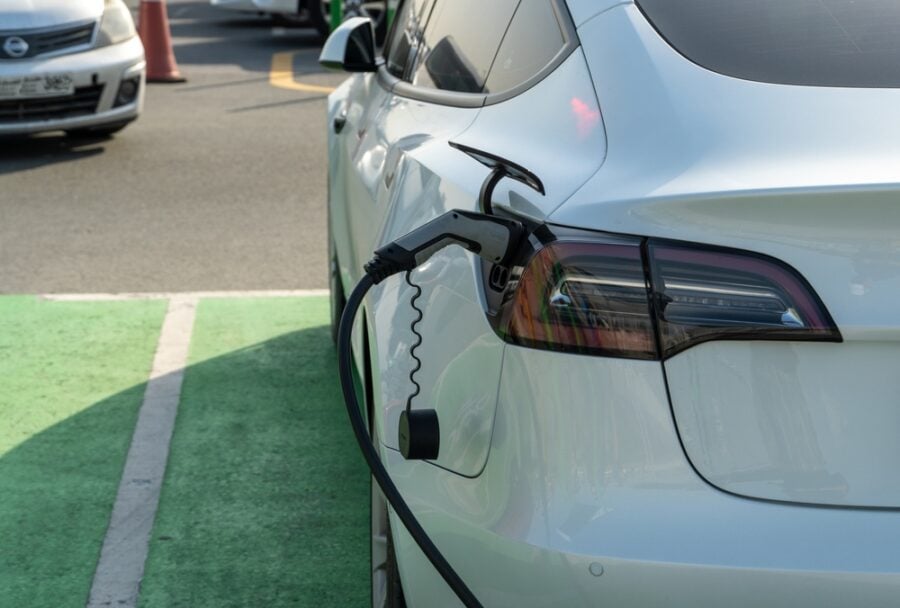Fluctuations in oil prices and environmental initiatives to reduce toxic emissions have contributed to the shift towards electric cars in the world.
With global sales rising in 2021 to 6.6 million cars, according to a report by the International Energy Agency, the share of these cars in the total market jumped to about 9 percent in the last month of 2021.
This comes in conjunction with the emergence of Saudi Arabia and the UAE as key players in this context, along with other countries that are working to motivate their citizens to use such types of cars.
UAE
The UAE is at the forefront of the MENA countries in adopting electric cars, with expectations indicating a future boom and thus market growth of up to 24 percent until 2026.
While the percentage of charging stations in the UAE is among the highest in the world, with about 240 stations, 80 percent of them are located in Dubai, according to the Clean Energy Industries Council in the MENA.
The increase in the number of charging stations was an incentive for UAE citizens to turn to these types of cars, which was evident in the market achieving remarkable growth.
The number of electric cars registered in Dubai alone reached 5,000 at the end of last January 2022, according to the latest statistics.
Car factory
The UAE’s contribution to this sector expanded to joining the global race to manufacture EVs.
Dubai Industrial City witnessed the launch of the first electric car “Al Damani” bearing the slogan “Made in the UAE”, manufactured by the Emirati company “Umm Glory”.
The new car is characterized by international standard specifications in terms of safety and integrated luxury, and it reaches a range of 405 kilometers on a single charge, and its priced at UAE 127,500 thousand ($34,710).
In addition, the UAE laid the foundation stone for the first car production plant powered by robots, with a production capacity of 70,000 cars annually.
The clean energy plant targets the Gulf, Arab, and East Asian markets.
Incentives
The data on electric car charging prices showed that the UAE is one of the cheapest countries in the world in terms of charging costs per kilowatt-hour.
The development of the infrastructure for electric cars in the country, the number and distribution of charging stations, and the different price segments, contributed significantly to the growth of sales.
The state has reduced registration fees for these cars, as well as facilities for eco-friendly car loans, in addition to securing safe parking spaces.
In addition, the Dubai Electricity and Water Authority (DEWA) has launched a comprehensive website dedicated to the latest developments and information related to electric vehicles in Dubai.
The site also covers the latest government strategies, goals, incentives and regulations related to electric vehicles.
The country offers the latest models of electric cars, high standards for charging stations, installations and locations, as well as insurance plans available such as green car loans for the purchase of EVs.
Saudi
Moving to Saudi, the Kingdom has joined the EV fever in order to reduce carbon and toxic emissions in the next 9 years.
As it works to develop infrastructure, the Riyadh Sustainability Strategy by 2030 aims to reduce carbon emissions in the city by 50 percent.
The Kingdom is also seeking to convert about 30% of the cars running on the streets of the capital, Riyadh, to EVs by 2030.
In addition, the country is pumping 346 billion riyals ($92 billion) into sustainability initiatives and projects, and stimulating the private sector with investment opportunities.
The Saudi sovereign wealth fund began investing years ago in electric vehicles through partnerships with car manufacturers.
In this context, the Saudi Public Investment Fund (PIF) signed an agreement with the “Lucid” company to build a factory for electric cars in the Kingdom.
It aims to buy a minimum of 50,000 vehicles, and a maximum of 100,000 within ten years, according to a statement issued by the Saudi government, which aims to diversify its fleet of official vehicles to be environmentally friendly.
It should be noted that Lucid is an American company that is 60% by PIF.
The Australian company “EV Metals” also announced a project to invest $3 billion in the Kingdom, to process metals used in electric car batteries.
This comes in conjunction with the enactment of new laws and the issuance of permits to attract such investments, represented by the announcement of the Saudi Standards and Metrology Organization to allow the commercial import of electric cars and their chargers.
It also announced that it had received requests from electric vehicle manufacturers to obtain a “model approval certificate for an electric vehicle”, and that it had issued an approval certificate for one model so far.
In June 2020, Saudi specifications allowed the commercial import of electric cars and their chargers, but on the condition that a Saudi model approval certificate was issued for the target models before the import process began.
The National Center for Industrial Development estimates that Saudi Arabia will have 50 percent of car sales in the Gulf Cooperation Council countries by 2025.








